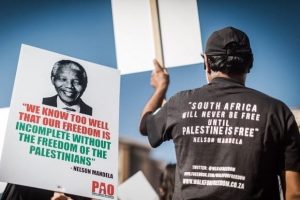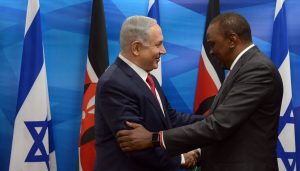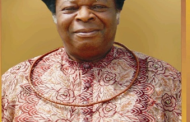It was not expected that South Africa which fought a national liberation war to sit comfortably along with Zimbabwe, Namibia, Angola and Algeria, helplessly watching the AU operationalise its ‘mercantile turn’ in African diplomacy.
This, however, being the age of surprises, nothing could be ruled out. Then came the explosion, with South Africa thumping its nose at the African Union for its decision to grant Israel observer status in the African Union, calling it unjust and unwarranted and that the country is appalled by it.
 How far the South African standpoint will change things remains to be seen. So far, South Africa is the only one of the three hegemons on the continent that appears capable of a categorical stand. Nigeria, the other hegemon, is too fragmented and confused domestically it will not be surprising if it keeps quiet. There is a bewildering understanding of Israel as a Christian country among a section of Nigerians. Whether that is deliberate or genuine ignorance remains unclear. Egypt, the third hegemon by African standard, might choose to unfold itself in Middle East international politics rather than in the AU. Unless it has already taken a categorical position, it might choose a different option in the context of Israel’s on-going exertions in the Middle East of a region.
How far the South African standpoint will change things remains to be seen. So far, South Africa is the only one of the three hegemons on the continent that appears capable of a categorical stand. Nigeria, the other hegemon, is too fragmented and confused domestically it will not be surprising if it keeps quiet. There is a bewildering understanding of Israel as a Christian country among a section of Nigerians. Whether that is deliberate or genuine ignorance remains unclear. Egypt, the third hegemon by African standard, might choose to unfold itself in Middle East international politics rather than in the AU. Unless it has already taken a categorical position, it might choose a different option in the context of Israel’s on-going exertions in the Middle East of a region.
Unlike the constrained hegemons, South Africa seems determined to be the African country without which the news is no news. Coming on the heels of the tension arising from sending one of her former rulers to cool his feet in the prisons is an avuncular statement described in informed circles as potentially capable of reversing doubts in the African Union as a credible force for the advancement of African interests. Contrary to the phenomenon signified by the African Union in allowing China to build a brand new secretariat for the organisation, South Africa is breaking ranks by the government’s rupturing of the AU’s observer status for Israel.

Could they be on their own?
The statement symptomatic of Nigeria’s ‘Africa Has Come of Age’ delivered by the late General Murtala Mohammed in 1976 is, unbelievably, what is coming out of OR Tambo Building, the basement of South Africa’s Department of International Relations and Cooperation, the rest of which goes as follows:
The African Union Commission has taken this decision unilaterally without consultations with its members. The decision to grant Israel Observer Status is even more shocking in a year in which the oppressed people of Palestine were hounded by destructive bombardments and continued illegal settlements of the land. The African Union strenuously objected to the deaths of Palestinians and the destruction of civilian infrastructure. The decision by the AU Commission in this context is inexplicable.
The unjust actions committed by Israel offend the letter and spirit of the Charter of the African Union. The AU embodies the aspirations of all Africans and reflects their confidence that it can lead the continent through the practical expression of the goals of the Charter, especially on issues relating to self-determination and decolonisation.
Israel continues to illegally occupy Palestine in complete defiance of its international obligations and relevant UN resolutions. It is therefore incomprehensible that the AU Commission chooses to reward Israel at a time when its oppression of Palestinians has been demonstrably more brutal.
The South African government will ask the Chairperson of the Commission to provide a briefing to all member states on this decision which we hope, will be discussed by the Executive Council and the Assembly of Heads of States and Government. South Africa firmly believes that as long as Israel is not willing to negotiate a peace plan without preconditions it should not have observer status in the African Union. The African Union cannot be a party in any way to plans and actions that would see the ideal of Palestinian statehood reduced into balkanised entities devoid of true sovereignty, without territorial contiguity and with no economic viability”.
Some critical observers are already calling this a good statement, saying the nationalism that led to the founding of the AU has long disappeared. They link this claim to how else anyone could understand the decision to allow the AU to seek funding from non-African sources.
While some people see a survival move in the decision to grant Israel observer status in the AU so as to attract funding from Israel, critics are saying it is sacrificing principles and strategic goals and, therefore, disgraceful.
So, is this split the return of the conflict between the radicals and the conservatives in African international relations? Has Israel got the resources to counterbalance China’s influence on and in South Africa as to hope for South Africa mellowing? In any case, South Africa is a cultural part of NATO, a large portion of which is decided that Israel is overplaying its card. How would all these play out?




























